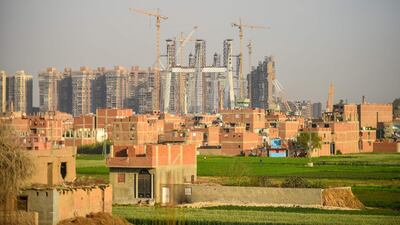Economic growth in the Middle East and North Africa is set to accelerate in 2020 on the back of reforms, particularly in Egypt and the Arabian Gulf, despite lower per-capita gross domestic product, according to the World Bank.
Mena growth in 2020 is forecast reach 3.4 per cent up from 1.5 per cent in 2019. Regional growth this year is projected to be slower than 2018’s 1.6 per cent because of a weaker global economy and financial-market volatility, the Washington-based lender said.
“The expected upswing [in 2020] from previous growth is partially driven by ongoing policy reforms to diversify the economy and strengthen the business environment,” the bank said. “However, Mena’s modest recovery will be insufficient to change its long-standing low growth in per-capita GDP. External factors by themselves are unlikely to be able to pull the region out of its growth doldrums.”
The Gulf and Egypt are undertaking various reforms to help buoy growth, lower the fiscal deficit and attract investments. In the Gulf, three countries have introduced 5 per cent VAT, some have increased their energy prices, while implementing other measures to contain the budget shortfall.
Egypt has undertaken reforms as part of a $12 billion aid package provided by the International Monetary Fund. These measures include devaluing the pound in 2017 and raising energy prices.
“We’re challenging the region to embrace ambitious reforms,” said Ferid Belhaj, World Bank vice president for the Middle East and North Africa region. “There’s an urgency today for reforms to improve productivity and encourage innovation and competition. We see that the countries that have taken difficult measures to implement policy reforms are the drivers of economic growth in Mena today.”
Mena countries should be growing at least at twice the rates they currently do, according to Rabah Arezki, World Bank's chief economist for the Mena region and lead author of the report.
Despite their economic diversification efforts, energy-rich Gulf region need to implement additional reforms to offset oil price fluctuations and cope with a lower oil price environment compared to the highs of 2014, when oil prices topped $100 a barrel. Though half of the Gulf economies grew faster than their peers during 2011-2014, all of them are forecast to expand at a slower rate than a typical high-income country during 2018-2021, the bank said.
Growth in the Gulf is forecast to reach 2.1 per cent in 2019 and 3.2 per cent in 2021, up from 2 per cent in 2018 and compared to a 0.2 per cent contraction in 2017 that was sparked by oil production cuts and lower crude prices.
“The revival of growth is partly and indirectly the result of policies that reduced the GCC’s reliance on oil revenues, the bank said. “Capital expenditure plans have been adopted by GCC countries that can afford it.”
In its record 2019 budget, Saudi Arabia, the Arab world's largest economy, will increase capital expenditure year-on-year by 20 per cent to 246 billion riyals which will help to finance initiatives under Vision 2030 transformation initiative.
Egypt is forecast to be one of the fastest growing economies in Mena, with the growth rate in 2019 reaching 5.5 per cent, the strongest expansion since 2008.
The economy is benefiting from an uptick in gas production, a resurgent tourism sector and higher government investment spending.
“Because rising revenues from VAT and income taxes have outpaced expenditures and subsidies have been cut several times, the fiscal deficit in Egypt has been narrowing for the past two years,” the World Bank said. “The improvement in the fiscal accounts, however, has also been aided by the improvement in
growth itself. This synergy between growth and fiscal reforms is expected to continue in the near term.”

